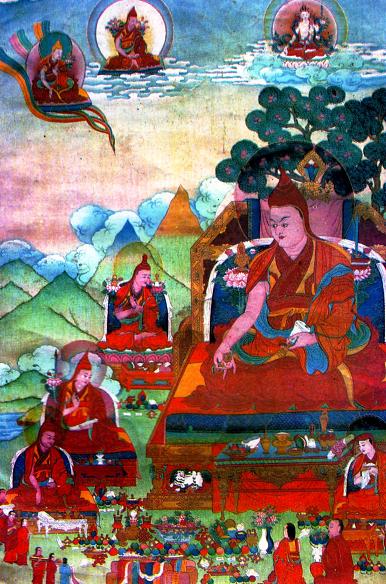Rimé
Jump to navigation
Jump to search

Rimé (Tib. རིས་མེད་, Wyl. ris med) — the ecumenical, non-partisan or non-sectarian movement begun by Jamyang Khyentse Wangpo and Jamgön Kongtrul and their disciples in Kham in the nineteenth century.
What is Rimé?
Khenpo Puntsok Namgyal says:
- The word Rimé (རིས་མེད་, Wyl. ris med) literally means 'unbiased' or 'non-partisan'. The opposite of rimé, bias or prejudice (Tib. རིས་སུ་ཆད་པ་, ris su chad pa), means being attached to one's own group or one's own tradition and having aversion towards others. In a broader sense, therefore, it can apply to all forms of bias and prejudice, including nationalism and racism, or even being attached to one's own town or family and thinking they are the best. Specifically in terms of the Dharma, bias or sectarianism means having attachment to one's own tradition and aversion to others. Of course, all the teachings of the Dharma are beyond this prejudice, and act as an antidote to attachment and aversion, but the Rimé tradition, as begun by Jamyang Khyentse Wangpo, placed special emphasis on the need to be free from this kind of sectarian bias, and was also characterized by the active propagation of teachings from all the practice lineages that existed in Tibet at that time. There had been teachers in the past who had practised the teachings of different traditions, but the Rimé movement was extraordinary in how its followers sought out all the transmissions that remained intact at that time in Tibet and then did all they could to preserve them and spread them as widely as possible.
Teachings on Rimé Given to the Rigpa Sangha
- Khenpo Puntsok Namgyal, Lerab Ling, 14 June 2007
- Orgyen Tobgyal Rinpoche, Lerab Ling, 25 August 2008
Further Reading
- E. Gene Smith, '‘Jam mgon Kong sprul and the Nonsectarian Movement' in Among Tibetan Texts, Wisdom, 2001, ISBN 978-0861711796
- Ringu Tulku, The Ri-me Philosophy of Jamgön Kongtrul the Great , Boston & London: Shambhala Publications, 2007, ISBN 978-1590302866